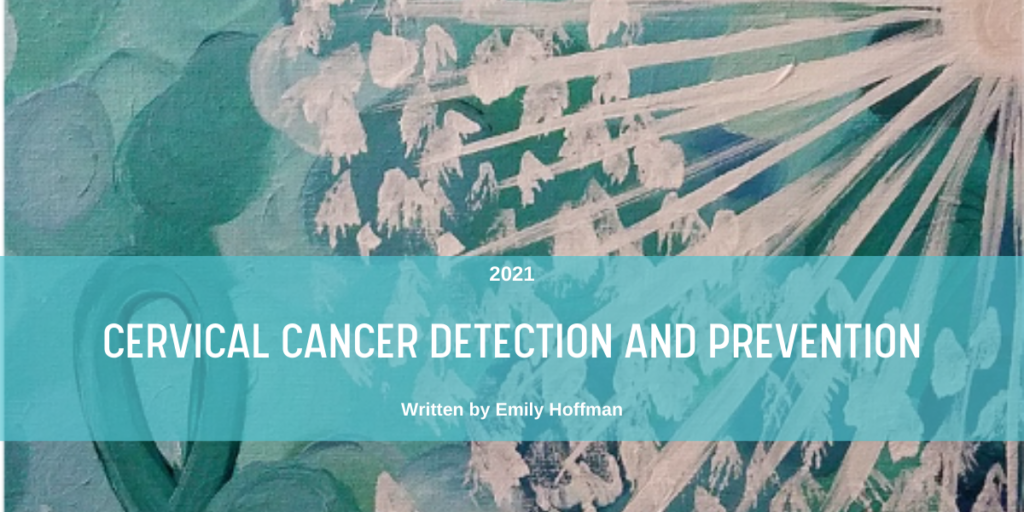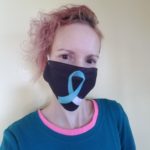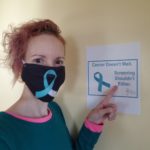Cervical Cancer Detection and Prevention

By: Emily Hoffman
“Your cervix looks different this year.”
 “Your cervix looks different this year,” said my primary care doctor, as she performed the pelvic exam part of my annual well-woman exam. I remember chuckling to myself, not fully grasping the severity of her comment yet. Instead, I laid on the table thinking, “How does she remember what my cervix looks like from year to year?” My doctor referred me to a gynecologist when the exam was over. I didn’t understand, but I also didn’t ask any questions. I visited the gynecologist two days later. She performed a colposcopy and referred me to an oncologist. Two days after that, I met with the oncologist and he told me that I had stage 2B cervical cancer. What started out as a routine exam had quickly turned into a life-threatening diagnosis.
“Your cervix looks different this year,” said my primary care doctor, as she performed the pelvic exam part of my annual well-woman exam. I remember chuckling to myself, not fully grasping the severity of her comment yet. Instead, I laid on the table thinking, “How does she remember what my cervix looks like from year to year?” My doctor referred me to a gynecologist when the exam was over. I didn’t understand, but I also didn’t ask any questions. I visited the gynecologist two days later. She performed a colposcopy and referred me to an oncologist. Two days after that, I met with the oncologist and he told me that I had stage 2B cervical cancer. What started out as a routine exam had quickly turned into a life-threatening diagnosis.
What if…?
How could I have cervical cancer? I didn’t feel sick. I had no symptoms. (Cervical cancer symptoms can include, but are not limited to, abnormal vaginal discharge, bleeding between periods, or pelvic pain during intercourse.) I went to my doctor every year for my annual well-woman exam and the results of my Pap tests always came back normal. But somehow, in the span of only one year, a 4 cm tumor had grown on my cervix. In one year, I went from having a normal Pap test result to having cancer. What a difference one year can make.
I started chemotherapy and radiation treatment to save my life. Doctors declared me cancer-free after I completed these treatments over the course of a few months. Today, I am a seven-year cervical cancer survivor. But my story could have been drastically different if I had skipped my well-woman exam that year.
What if I had used an excuse, like “I’m too busy”, to justify putting off that appointment? Or what if I had told myself that skipping one year wouldn’t hurt anything because I’m a generally healthy person? What if I had assumed my Pap test results would continue to be normal like they always had been? How much longer would my cancer have gone undetected? How far would my cancer have spread without my knowing? Would my prognosis have been different if my cancer wasn’t detected when it was? Would I even be alive today?
The importance of cancer screenings
A cancer diagnosis is life changing while a cancer screening is lifesaving. The reality of my story is that scheduling my annual well-woman exam saved my life. My cancer was caught early enough for it to be effectively treated because I went to my doctor every year. If I had not scheduled my well-woman exam that year, my cancer would have continued to grow undetected and my life would have been at risk.
A well-woman exam is an annual preventative care exam that includes a breast exam, pelvic exam, and Pap test. The Pap test is a screening test that can help detect cervical cancer. The HPV test is another screening test that also helps detect cervical cancer. When the Pap test and HPV test are both performed during an exam, it is referred to as co-testing.
New ACS guidelines recommend cervical cancer screening with the HPV test or the HPV/Pap co-test every five years for people with a cervix age 25 to 65. If the HPV test is not available, then doctors recommend a Pap test every three years.
What are you waiting for?!
January is Cervical Cancer Awareness Month. Therefore, it is the perfect time of year to:
- Reduce your risk for cervical cancer through screening tests, like the Pap test and HPV test
- Take care of yourself by scheduling your annual well-woman exam
- Raise awareness for cervical cancer detection and prevention by telling your family and friends to schedule their annual well-woman exams
- Benefit from Iowa’s Care for Yourself program, which provides free or low-cost cancer screenings for Iowans
- Make a resolution to protect your health all year long
About the Author
Emily Hoffman is a seven-year cervical cancer survivor who was diagnosed with stage 2B cervical cancer at age 30. She is a patient advocate and Cervivor Ambassador who shares her cancer story to raise awareness for cervical cancer and educate others on the importance of cancer screenings and prevention. Emily is the recipient of the 2020 Cervivor Spark Award. She is currently pursuing her certification to become a cancer registrar.






